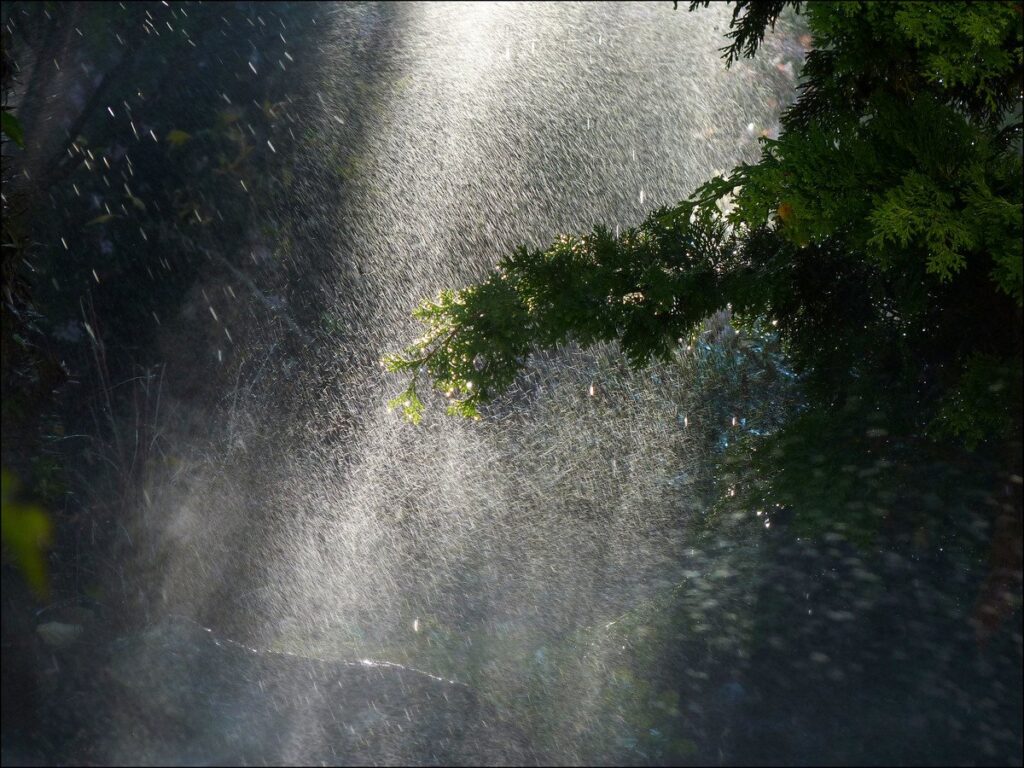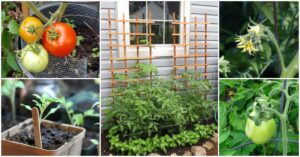Does Rainwater Make Vegetation Greener?

Many gardeners have observed that grass is greener and crops look more healthy after rain. They conclude that rainwater is healthier for gardens than faucet water. Is that basically true? Is rainwater higher than faucet water? Does rainwater make our gardens greener?
Let’s open that umbrella and discover out.

Key Takeaways
- There isn’t any proof that rain makes the backyard greener.
- Faucet water comprises simply as a lot nitrogen as rain.
- Nitrate ranges in rain will not be important sufficient to have an effect on nitrates within the soil.
Are Vegetation Greener After a Rain?
Many consider crops are greener after rain, however it’s in all probability not true.
I wrote an article just a few years in the past in regards to the impact of lightning on nitrogen ranges and regarded for proof that crops are greener after rain. I discovered none. I even requested readers to let me know in the event that they discovered some knowledge – none was reported. I regarded once more as we speak and located none.
Rain will wash mud off leaves which can make them look greener, however that doesn’t imply the leaves are literally greener.
Wet days are usually cooler which is a profit to crops in the midst of summer season.
Vegetation which might be below drought stress will enhance after rain.
The quantity of water in a rain occasion is big in comparison with most irrigation accomplished by gardeners. For that reason alone, crops will develop a lot better after rain.
Rain is actually good for the backyard, and it helps crops develop, however there may be little proof that it causes a greening impact. If you happen to discover some proof for greening, please add it to the feedback beneath.
Nitrogen Ranges After a Rain
The declare by gardeners is that nitrogen ranges within the soil improve after rain. Water floating down by the air picks up nitrogen and deposits it on and close to crops. Lighting provides much more nitrogen to the method.
In agriculture, it’s properly understood that heavy rains cut back plant-available nitrogen and may result in nitrogen deficiencies in crops. That’s the reverse opinion of gardeners.
4 key components have an effect on the nitrogen stage within the soil, and an estimate of the consequences is as follows:
- Leaching: – 1.2 g/m2/rain occasion
- Rain: + 0.5 g/m2/y
- Lightning: + 0.2 g/m2/y
- Mineralization: + 1.5 g/m2/y
The info for these estimates is absolutely mentioned in my submit referred to as Soil Nitrogen Ranges After a Rain.
Leaching and mineralization have the best impact. The nitrate ranges in rain and from lightning are insignificant in comparison with the opposite components.
Examine that to the quantity added by a single software of fertilizer to your garden: 4.9 g/m2.
Water Makes Vegetation Develop Higher
A rise in water within the soil may have a optimistic impact on crops, supplied the quantity shouldn’t be extreme. Larger ranges of water permit crops to soak up extra by their roots. As they take up water, in addition they take up extra nitrogen, which ends up in extra chlorophyll, extra plant development, and more healthy crops.
Watering from a faucet does the identical factor, however the quantity of water utilized to a backyard from rain is way more than irrigation water. The easy act of including rain to the backyard will make crops greener and more healthy.
Rainwater vs Faucet Water
Some individuals really feel that the greening impact is because of the truth that rainwater is a lot better for crops than faucet water. This may increasingly or might not be true.
Most faucet water does have the next pH, normally between 6.5 and eight.5. Rainwater is normally acidic, round 6.5. The decrease pH makes it simpler for roots to entry sure micronutrients. This may increasingly have an effect, however clay and natural matter have a powerful buffering capability and would in all probability neutralize the pH impact, particularly in alkaline soil.
Keep in mind that rain has been falling for thousands and thousands of years, and such soil remains to be alkaline.
Nitrate in Faucet Water
What’s the nitrogen stage in faucet water? Is it actually a lot decrease than rainwater?
Nitrate is the most typical type of nitrogen in each rain and faucet water. Pure nitrate ranges in consuming water are normally lower than 3 mg/l. A protected worth is 10 mg/l. About 4 p.c of personal wells constructed in Minnesota since 1991 have nitrate ranges above 3 mg/l.
Nitrate concentrations in rainwater within the USA vary from 0.5 to eight mg/l, with a mean of about 1.5 mg/l.
Based mostly on this knowledge, the quantity of nitrate in rainwater and consuming water is about the identical.
Gardening Myths About Rainwater
The next claims are made by gardeners.
Declare: Some crops like blueberries don’t do properly with faucet water.
Fact: Blueberries are acid-loving crops and don’t do properly at larger pH. It’s the pH of the soil and never the water that makes the distinction.
Declare: Faucet water comprises an excessive amount of chlorine and is unhealthy for crops.
Fact: The chlorine added to faucet water shouldn’t be dangerous to crops.
Declare: Letting faucet water sit for just a few days eliminates chlorine.
Fact: That is true for chlorine, however not for chloramine, which can also be used to chlorinate faucet water.
Declare: Rainwater has a excessive nitrogen content material that properly water doesn’t have.
Fact: Rainwater has fairly a low stage of nitrogen. Nicely water and faucet water comprise about the identical nitrogen stage as rainwater.
Declare: Lightning hits the bottom and expenses the earth, which releases vitamins.
Fact: I doubt that’s true.
Declare: Harvesting rainwater in some states is illegitimate.
Fact: This can be a fantasy that makes the rounds yearly, however it’s incorrect.
Declare: Rainwater is healthier as a result of faucet water comprises fluoride.
Fact: The quantity of fluoride added to faucet water is kind of protected for crops, however pure water in some areas can comprise ranges excessive sufficient to hurt crops.
Declare: Rainwater comprises numerous minerals.
Fact: It comprises very low ranges of minerals. Faucet water normally has larger ranges.
Declare: Snowmelt truly provides a reasonably notable quantity of N to crops.
Fact: It provides little or no nitrogen, not more than rain. The opposite drawback with snow is that a lot of it runs away because it melts as a result of the bottom remains to be frozen.
I even have a group of myths about amassing rainwater.









